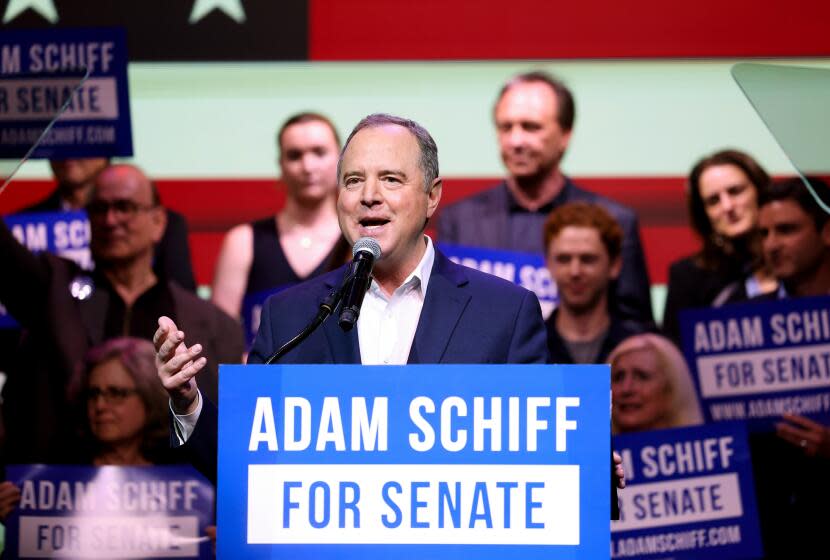Column: A land of flaming liberalism? Senate results contradict California stereotype

Adam Schiff got the November opponent he wanted.
Steve Garvey was set up to be knocked down.
And by year's end, California will very likely have a new U.S. senator in the mold of its past one, Dianne Feinstein, whose former seat Democrat Schiff is vying to fill.
Read more: Primary election results: Congressional and California
The voters spoke Tuesday in the state's marquee election and what they said was: We'll stick with what we know.
By choosing Schiff, a Burbank congressman who was the most moderate of the major Democratic candidates — and thus most Feinstein-like — they rejected the leftward swerve promised by two more liberal alternatives, Reps. Katie Porter of Irvine and Barbara Lee of Oakland.
By advancing the Republican Garvey to November's general election, voters set up a conventional match between candidates of opposing parties and philosophies, rather than an atypical Democrat-on-Democrat runoff turning on personal temperament and differences of political degree.
And by elevating Garvey over Porter, they also effectively settled the Senate contest with eight months still to go before the general election.
There are no certainties in life. The same goes for politics.
However, barring an extraordinary set of circumstances, Schiff will be California's next U.S. senator, taking over for the placeholding Laphonza Butler, who was appointed to replace Feinstein after her death in September.
Read more: Schiff and Garvey are headed to November showdown for coveted California Senate seat
(A brief refresher: Under California's election system, the top-two primary finishers advance to November's general election, regardless of party. The winner will finish Feinstein's term, ending in January, then begin a full six-year term. Schiff is much happier facing Garvey than Porter, who would have been a much tougher opponent.)
Democrats enjoy a nearly 2-to-1 voter registration advantage in California and all but those blinded by partisanship can see the gulf between Schiff and Garvey when it comes to political experience, knowledge and capability.
Making his first bid for political office, Garvey has proven to be as empty as a vacuum tube. His political positions are paint-by-number, and suggest just as much consideration. The former Dodgers and Padres baseball star didn't run a campaign so much as stand still and wait for GOP voters to come his way.
His finish shouldn't come as a huge surprise. Candidates with an "R" by their name can expect roughly 40% support in a general election in California, so it wasn't difficult to garner enough backing in the primary to move ahead to November, especially with Schiff, Porter, Lee and several others splintering the Democratic vote.
With roughly half the returns counted, Porter was running a distant third, trailing Garvey by nearly double digits in the race for the full, six-year term.
Lee, the most unabashedly liberal of the leading Democrats, never stood much of a chance. Her appeal beyond her uber-progressive Oakland congressional district was always suspect and her age — 77 — didn't help, particularly after the sad, prolonged decline of Feinstein turned longevity into an issue for many Democrats.
Of course, Garvey, who didn't sink a penny into TV advertising, benefited enormously from the tens of millions that Schiff and his allies spent promoting his candidacy. Garvey was too MAGA and too conservative for California, Schiff's ads asserted, which was catnip to the GOP base, which didn't seem to mind Garvey's 75-year-old rookie status. The tactic was a way for Schiff, 63, to have a hand in choosing his preferred opponent, which generated a good deal of hand-wringing and commentary.
Much of it was overwrought.
Elections are about winning, within legal and certain moral bounds, not playing by an imaginary set of rules dictating kindness or sportsmanship. Porter fiercely objected when Schiff began featuring Garvey in his ads. Then, when Garvey began moving up in polls, Porter attempted the same tactic, promoting a lesser-known Republican, Eric Early, in hopes of splitting the GOP vote.
So much for holding the high ground.
You can dislike the machinations, but Schiff didn't manufacture Garvey's party affiliation or stance on issues. The votes Garvey received were entirely legitimate and reflect the views of a not-insignificant slice of the electorate.
California has 5 million registered Republicans, a number exceeding the population of 28 states. While it's easy to overlook them— especially for Democrats and their partisans — many GOP faithful are presumably glad to have someone to vote for who represents their party, rather than having to choose a least-bad Democrat.
Read more: Forget election night answers: Results may take far longer in many close races
Would-be successors spent years circling Feinstein's Senate seat, convinced time would inexorably force her exit. Porter, to her credit, ended the shadow campaigning by declaring her candidacy weeks before Feinstein announced plans to step down after her sixth term. (She died in office seven months later.)
In an interview with Rolling Stone, Porter, 50, was asked about Schiff’s frequent invocation of the late senator, who quite likely would have preferred the more moderate, less confrontational Schiff as her successor.
The Orange County lawmaker's acerbic response — “Sen. Feinstein, as you know, has passed away, and is not able to endorse from the grave” — is indisputable. Besides, the choice wasn’t Feinstein’s to make, even if she were alive.
The choice was up to California voters and by ushering Schiff to November and an expected victory over Garvey, they showed that Feinstein's center-left ideology, studious manner and results-oriented approach to governing have not lost their appeal — even if the outcome might contradict the stereotype of the state as a wacky land of flaming liberalism.
The center — or what passes for it in California — prevailed.
Get the latest from Mark Z. Barabak
Focusing on politics out West, from the Golden Gate to the U.S. Capitol.
Sign me up.
This story originally appeared in Los Angeles Times.
